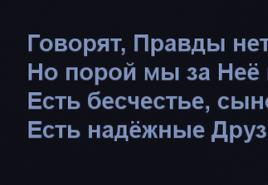However, with Mikhail Leontiev. However However 1
Mikhail Leontiev is a Russian TV journalist, publicist, editor-in-chief of the weekly of the same name with the program. Since October 2007, in addition to his author's program "However", he has also been the host of the geopolitical analytical program "The Great Game" - a series of programs dedicated to the history of the confrontation between Russia and Great Britain for dominance in Central Asia in the 19th and 20th centuries. Member of the United Russia party. Mikhail Leontiev - winner of the Golden Pen of Russia award, nominee for the TEFI-1997 award.
As a television publicist, Mikhail Vladimirovich Leontiev is a rather bright, charismatic and outstanding personality, he is a talented debater and an angry speaker, a frequent guest of television debates on current political topics. In his broadcasts and publications, Leontiev, without hiding, zealously defends his political creed - he calls himself a right-wing conservative.
Mikhail Leontiev about television and about himself: “Only a complete idiot can think that a major channel is ready to work to inform the viewer. The channel sells the product, it needs to be packaged. CNN, for example, is a colossal ideological tool in the West. A striking example of this is the situation around Yugoslavia. How effectively brainwashed a very civilized part of humanity! The question is methods. If a consumer eats stale bread, no one will give him poppy seed buns. I am an absolutely committed person. Yourself. I have specific political views. I am not a journalist. I do political propaganda. I am a commentator, and if a person comments on events without having his own position, then this phenomenon is painful.”
One of the most “insidious” words is “however”, a comma is either placed or not, so writers often doubt where to put a comma and whether it is needed at all. To decide whether the word “however” is separated by commas or not, one must first understand what syntactic role this word plays in this case, whether it is an introductory word, conjunction or interjection.
The word "however" is separated by commas
From two sides
1. If this is an introductory word (it can be rearranged or even thrown out without loss of meaning, replaced with a synonymous introductory “nevertheless”), then it is separated by commas on both sides.
- The boat on Borisovo, however, has not yet arrived.
- We were all, however, very cold and hungry.
2. Either commas on both sides, or an exclamation mark (if it is at the beginning of a phrase; depending on intonation), an interjection is formed; it can be replaced by another interjection, such as "wow".
- Look, however, what a wind!
- Oh, but it's already two o'clock! (However! It's already two o'clock!)
Before the word
1. It is often remembered that a comma at the beginning of a sentence after “however” is not put, but we saw that this is possible if we have an interjection in front of us (that is, just such an emotional exclamation). A comma is not put in the event that we have a union, synonymous with "but". Indeed, it often stands at the beginning of a sentence or at the beginning of a complex part. The comma after "however" is not needed in this case.
- We walked, but it was already very late, and we went home (can be replaced with the union "but")
- It was already very late, but we did not go home, but to the park (can be replaced with the union “but”).
2. Only before the introductory word "however" a comma is placed if it is at the beginning of a separate turnover.
Leontiev Mikhail on today's television is one of the brightest and most clearly following his principles of journalists. Under his editorship, the magazine "However", he is the permanent host of the program of the same name on Channel One. Through the prism of his perception, he seeks to convey to viewers and readers information about the most important and relevant political events and does this with his inherent openness and sarcasm. Opponents call the journalist a "bearded ulcer".
Mikhail Leontiev. Biography
He was born on 10/12/1958 in a family of Moscow intellectuals. From childhood, Mikhail Leontiev differed from his peers in education and not the simplest character. In 1979 he completed his studies at the Moscow Institute of National Economy. Plekhanov, where he studied with a degree in Labor Economics. During his studies, he was fond of reading forbidden anti-Soviet literature, in particular the magazine Posev, where many dissidents of that time were published.
Immediately after graduating from the university, Mikhail Leontiev began working at the Institute of Economic Problems, moonlighting as a tutor. However, he soon decided to drastically change his life and, unexpectedly for everyone, radically changed his profession. In 1985, having a higher education, Mikhail Leontiev graduated from a vocational school, where he studied the skill of a cabinetmaker.

Professional activity
Mikhail Leontiev came to journalism at the same time. The first milestone on this path is the political section of the Kommersant newspaper. A year later, in 1990, Mikhail headed the economics department at Nezavisimaya Gazeta. In the early 90s, he made a great contribution to the creation of the Segodnya publication and became the first deputy editor-in-chief. But the ongoing changes in the editorial policy of the newspaper a little later became the reason for the departure of the journalist, who categorically disagreed with them.

Popularity came to Mikhail Leontiev after he ran in 1995 for the State Duma. Then he lost the election. Big was caused by his statements about the introduction of troops into Chechnya.
Mikhail Leontiev - TV presenter
In 1997, the journalist became the founder of the Delo magazine. The sponsor was M. Khodorkovsky, but the publication never went to press.
In the same year, M. Leontiev came to television, where he became the host of the program "Actually", which went on the air under his leadership at TVC. Later he was the host of the analytical program "The Seventh Day". Leontiev combined his profession with work in print media. Known for his column "FAS!" in company". In the same 1997, the journalist was nominated for TEFI, and in 1998 he won the Golden Pen award.

2000s
In 1999, Mikhail Leontiev came to the ORT channel, where he began to host the author's program "However". He remains its permanent leader to this day. In 2002, the journalist joins the United Russia party, however, according to Mikhail Leontiev himself, he is simply “listed” there. In 2007, Leontiev was appointed editor-in-chief of the Profile magazine, but two years later he left the editorial office of the magazine. In 2009, the journalist became a co-founder of the Odnako magazine together with Channel One. Since 2014, a new vice president has been appointed at Rosneft - Mikhail Leontiev. Photos of him scattered across the web and pages of business publications in the country. Later he will head the department of information and advertising.
Leontiev is married for the second time. He has two adult children from his first marriage. The ex-wife immigrated to America, and the children have now returned to Russia. In the second marriage with M. Kozlovskaya, a daughter, Daria, was born. The journalist does not advertise his personal life.
The press often discusses such an odious personality as Mikhail Leontiev, the nationality of a journalist. The TV presenter himself considers himself a Russian Orthodox Christian, but at the same time, according to L. Nevzlin, he repeatedly had conversations with Mikhail about his Jewish roots.
However, however I union1. It is used when opposing individual homogeneous members of a sentence.
2. It is used when contrasting sentences in a compound, indicating 1) relations of complete opposition 2) relations of inconsistency 3) relations of inconsistency with shades of complete or limited opposition.
3. It is used when opposing one sentence to another or a series of sentences, being at the beginning of a sentence and delimiting what was said earlier.
4. It is used to strengthen the opposition of the main and subordinate clauses, being at the beginning of the second sentence and corresponding in meaning to the next: however, after all. ott. It is used as an introductory word, corresponding in meaning to the words: nevertheless, be that as it may, after all, nevertheless.
II int. unfold An exclamation of great surprise or indignation.
Explanatory Dictionary of Ephraim. T. F. Efremova. 2000.
however this:
however ( often combined with particle"same" or"and"). 1. antagonistic alliance. It is used to attach sentences or individual members of a sentence with the meaning of opposition, inconsistency with the previous one, or limitation of the previous one; close in meaning to unions: Yes , But . [The lion] rushed with all four legs; However, he could not jump over the abyss. I. Krylov, Leo, Chamois and Fox. We never hoped to meet again, but we did. Lermontov, Bela. Alyosha guessed that the captain had not appeared at the state farm by chance. However, his father's cunning policy did not offend him at all. L. Sobolev, Green beam. || It is used when opposing the main clause to the subordinate clause or one of the members of the sentence to another with a concessive union. Although listening to all sorts of nonsense is not akin to the gods, This time, however, Zeus listened to them. I. Krylov, Frogs asking for the Tsar. Ah, if the martyr of love Suffering from passion hopelessly; Although it is sad to live, my friends, However, it is still possible to live. Pushkin, Ruslan and Lyudmila. 2. in meaning introductory sl. Nevertheless, nevertheless, nevertheless. Passionately devoted to the master, he, however, does not lie to him on a rare day. I. Goncharov, Oblomov. [Natalya Petrovna:] I didn't know that you were in such friendship with him... Look, however, Vera, be careful. Turgenev, Month in the village. 3. in meaning between. Used to express surprise, bewilderment, indignation, etc. [Modest Alekseich] took a pear, crushed it with his fingers and asked hesitantly: - How much does it cost? - Twenty-five cents. - However! - he said and put the pear in place. Chekhov, Anna on the neck. Time passed faster than on other days - when they finished drinking tea, it was already about noon. - However! - exclaimed Lyudmila. M. Gorky, Mother.Small academic dictionary. - M.: Institute of the Russian language of the Academy of Sciences of the USSR. Evgenyeva A.P.. 1957-1984.
However
Wiktionary has an article "however"However - expresses opposition, sometimes - strong surprise or indignation.
However:
- However - an adversative conjunction, also an introductory word or interjection.
- "However" is an information and analytical author's television program.
- "Odnako" is a business analytical weekly glossy magazine.
How many semantic meanings does the word "HOWEVER" have? What does it mean in its pure meaning?
Twilight
However, the meaning of the word However Dahl's Dictionary lexical direct and figurative meanings and interpretations of the word However
However - adv. however, app. southern alone, but in spite of that, with all that; | apparently, right, it seems, as if, of course. | Sib. I think it should be. I agree, but with a caveat. Everything is good, but the end is bad. Nauseous to me though. However, it will rain. Are you going though? tea. Where is Ivan? ""however at home; seems at home, sib. When did your brother leave? "" However, yesterday "", somehow, it seems. Come, however, to the matchmaker, Vyat. come along the way, at the same time, by the way. | Gov. vm. the same and the same, the same, all the same, equal, or the same. All the same, all the same, all the same. To the patient however, as yesterday.
However, the meaning of the word However Financial dictionary lexical direct and figurative meanings and interpretations of the word However
However - However, organizations and citizens whose activities are associated with an increased danger to others are obliged to compensate for the harm caused by a source of increased danger, even if there is no fault on their part. The decision on compensation for harm is made in civil proceedings.
However, the meaning of the word However Ozhegov's dictionary lexical direct and figurative meanings and interpretations of the word However
1) However - See but 1 N1
HOWEVER. 1. union. Same as but1 (in 1 value). Already an old man, oh. cheerful soul. 2. introductory sl. However, all the same. Always careful about your promise, oh , forgot. 3. Expression of strong surprise, bewilderment. He is married for the third time. - 0! * And yet, the union is the same as however (in 1 value). Old, but cheerful. However, the union and enter, sl. - same as nonetheless. Wrong, but debatable. They were in a hurry, but they were too late.
Alexandr grave
However - adv. however, app. southern alone, but in spite of that, with all that; | apparently, right, it seems, as if, of course. | Sib. I think it should be. I agree, but with a caveat. Everything is good, but the end is bad. Nauseous to me though. However, it will rain. Are you going though? tea. Where is Ivan? ""however at home; seems at home, sib. When did your brother leave? "" However, yesterday "", somehow, it seems. Come, however, to the matchmaker, Vyat. come along the way, at the same time, by the way. | Gov. vm. the same and the same, the same, all the same, equal, or the same. All the same, all the same, all the same. To the patient however, as yesterday.
2) However - nevertheless, nevertheless
User deleted
1. the union is opposing. The same as "but" (often in combination with the particle "same" or "g", with which it is written in one word). Eugene has long fallen out of love with reading, however, he excluded several creations from disgrace. Pushkin. He promised, but did not deliver. 2. in value introductory word. Nevertheless, nevertheless, nevertheless, be that as it may (often in combination with the particle "same" or "g", with which it is written in one word). What, however, frightened me? Nekrasov. However, did you say what rank I have and where I serve? Gogol. 3. in value interjections. With an exclamatory intonation in a remark, use. to express great surprise or indignation at something. excessive, crossing the boundaries (colloquial).
And the word "however" is an introductory word?
Alexandra200016
The word, however, is introductory if it is inside or at the end of the sentence: Ganin, however, was never too generous with praise (Tendr.). In the meaning of the opposite union, however, it can connect
homogeneous members of a sentence or part of a complex sentence: Father promised to come from the city early, but was delayed; The fog was noticeably thicker, but the roofs of the houses were still visible; Just as easily, carefree, he returned to the hotel. However, something has already changed (Boon.).
Note. After the union, however, there can be a separate turnover, and then the comma that appears after however separates this particular turnover: However, having thrown open the cool door that smelled of official paint, he was convinced that everything was the same here (Fad.) - after the union, a participial turnover.
Sometimes the word however at the beginning of a sentence can function as an interjection and be separated by a comma precisely on this basis: However, what a wind! (Ch.)
HOWEVER
HOWEVER
HOWEVER.
1. union adversarial. The same as "but" (often in combination with the particle "same" or "zh", with which it is written in one word). "Eugene has long fallen out of love with reading, however, he excluded several creations from disgrace." Pushkin. He promised, but did not deliver.
2. in meaning introductory word. Nevertheless, nevertheless, nevertheless, be that as it may (often in combination with the particle "same" or "g", with which it is written in one word). “What, however, frightened me?” Nekrasov . “However, did you say what rank I have and where I serve?” Gogol .
3. in meaning interjections. With an exclamatory intonation in a remark, use. to express strong surprise or indignation at something excessive, crossing the line (colloquial).
Explanatory Dictionary of Ushakov. D.N. Ushakov. 1935-1940.
Synonyms:
See what "HOWEVER" is in other dictionaries:
However…
Though … Spelling Dictionary
however- though … Spelling Dictionary of the Russian Language
adv. however, western, southern. alone, but in spite of that, with all that; | apparently, right, it seems, as if, of course. | sib. I think it should be. I agree, but with a caveat. Everything is good, but the end is bad. Nauseous to me though. However… … Dahl's Explanatory Dictionary
1. union. Same as but 1 (in 1 value). Already an old man, oh. cheerful soul. 2. introductory However, still. Always neat, about his promise, oh, forgot. 3. Expression of strong surprise, bewilderment. He is married for the third time. ABOUT.! And yet, the union is the same as ... ... Explanatory dictionary of Ozhegov
- (folk. alone), but, all the same, all the same, behind all that, with all that, nevertheless; however, yes and that, meanwhile. And you, friends, no matter how you sit down, you are not good at musicians. Wing. Still, I feel a little sorry for you. Pushk. Though the eye sees, yes the tooth ... ... Synonym dictionary







